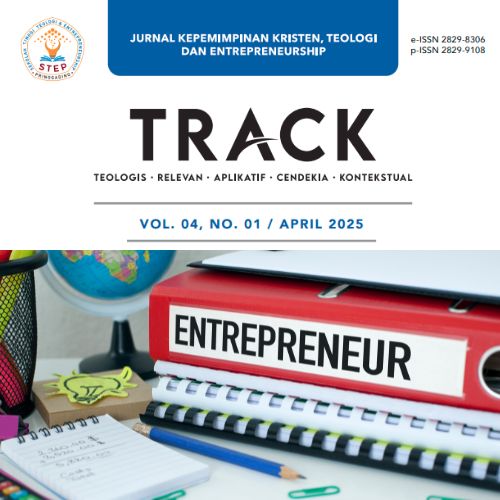PRAKTIK SOSIAL ENTREPRENEUR GUNA PENGEMBANGAN LIFE SKILL PENYANDANG DISABILITAS DI BALAI KARYA BERKAT SALATIGA
DOI:
https://doi.org/10.61660/track.v4i1.211Keywords:
Sosial Entrepreneurship, Life Skills, DisabilityAbstract
Social entrepreneurship is an innovative approach that combines social goals with entrepreneurial principles. This study aims to explore the practice of social entrepreneurship at Balai Karya Berkat Salatiga and its role in developing life skills for persons with disabilities. Using a qualitative method with a case study approach, the research found that Balai Karya Berkat Salatiga successfully created an inclusive environment that supports the economic and social empowerment of persons with disabilities. The results show that social programs in the form of entrepreneurship skills training can enhance the independence and self-confidence of persons with disabilities. These findings have significant implications for developing a sustainable community-based empowerment model.
Downloads
References
Albert Bandura. (1997). Self-Efficacy: The Exercise of Control. W.H. Freeman and Company.
Creswell, J. W. (2013). Reserch Design, Pendekatan Kualitatif, Kuantitatif dan Mixed [Research Design, Qualitative, Quantitative and Mixed Approach ] (Ketiga). Pustaka Pelajar.
Daniel Goleman. (1995). Emotional Intelligence: Why It Can Matter More Than IQ. Bantam Books.
Dees, J.G., Emerson, J., & Economy, P. (2001). Enterprising Nonprofits: A Toolkit for Social Entrepreneurs. Wiley.
Ima Susilowati, & Indana Laazulva. (2014). Assessment on Private Sector Employment of People with Dissability. CIRCLE Indonesia.
Kementrian Pendidikan dan Kebudayaan. (2024, December 3). Bukti Kesuksesan Penyandang Disabilitas di Ruang Publik Berkat Penyediaan Dukungan dan Peluang. Kemendikbud.Go.Id. https://www.kemdikbud.go.id/main/blog/2024/12/bukti-kesuksesan-penyandang-disabilitas-di-ruang-publik-berkat-penyediaan-dukungan-dan-peluang#:~:text=Berdasarkan data Badan Pusat Statistik,%2C5%25 dari total populasi.
Lemmi, V., Kuper, H., Blanchet, K., & Joerg Guenter Weber. (2016). Community-based rehabilitation for people with disabilities. ResearchGate. https://www.researchgate.net/publication/304351165_Community-based_rehabilitation_for_people_with_disabilities
Listyani, T. T., Widiyati, S., Wijayanto, E., Rois, M., Fatati, M., Martia, D. Y., Adhi, N., & Rikawati. (2024). Pemberdayaan Potensi Insan Difabel Guna Peningkatan Kemandirian Finansial Melalui Pendampingan Produksi Kain Lukis dan Pengelolaan Usaha. JAMASKU, 2(2), 86–100. https://jurnal.polines.ac.id/index.php/jamasku/article/view/5345
Lukas, T., Menayang, A. P., & Marta, R. F. (2021). Peran Perusahaan Alfamidi Membangun Kepercayaan Diri Difabel Dalam Dunia Kerja. Jurnal Komunikasi Profesional, 5(1).
Sandiki, R., & Kustiadi, J. (2024). ENTREPRENEURSHIP DALAM PELAYANAN GEREJAWI. TEOLOGIS-RELEVAN-APLIKATIF-CENDIKIA-KONTEKSTUAL, 3(1), 61–89. https://doi.org/10.61660/track.v3i1.173
Saragih, E. S. (2019). Fungsi Gereja Sebagai Entrepreneurship Sosial dalam Masyarakat Majemuk. Kurios: Jurnal Teologi Dan Pendidikan Agama Kristen.
Sari Dewi Poerwanti. (2017). Pengelolaan Tenaga Kerja Difabel untuk Mewujudkan Workplace Inclusion. INKLUSI: Journal of Disability Studies, 4(1), 1–24.
ukm.pedulidifabel. (2022). Preliminary Research 2022: Keterlibatan Difabel dalam Dunia Kerja. pedulidifabel.ukm.ac.id. https://pedulidifabel.ukm.ugm.ac.id/2022/11/28/preliminary-research-2022-keterlibatan-difabel-dalam-dunia-kerja/?utm_source=chatgpt.com
UU No.8 Tahun 2016. (2016). Undang-Undang Nomor 8 Tahun 2016 tentang Penyandang Disabilitas. Pemerintah Pusat Republik Indonesia. https://peraturan.bpk.go.id/Details/37251/uu-no-8-tahun-2016
WHO. (1994). Life Skills Education for Children and Adolescents in Schools. World Health Organization.
WHO. (2023). Disability. World Report on Disability. https://www.who.int/news-room/fact-sheets/detail/disability-and-health .

Downloads
Published
How to Cite
Issue
Section
License
Copyright (c) 2025 Dwi Novita Sari, Fibry Jati Nugroho

This work is licensed under a Creative Commons Attribution-NonCommercial-ShareAlike 4.0 International License.















